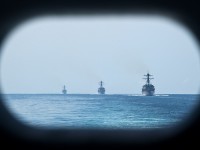Joseph Chinyong Liow, Senior Fellow, Foreign Policy, Center for East Asia Policy Studies
Jul 14, 2016
The author argues that China should work to bring the Code of Conduct it has been discussing with ASEAN to a conclusion and continue to engage concerned states in dialogue. He also cautions that Washington must be careful not to inadvertently contribute to the militarization of the region.
Shen Dingli, Professor, Institute of International Studies, Fudan University
Jul 13, 2016
Following an international tribunal's announcement of its ruling on the South China Sea disputes between the Philippines and China, Chinese scholar Shen Dingli argues the Permanent Court of Arbitration overreached to consider a case which is about sovereignty in nature, adding the ruling runs counter to what an international convention is all about - respecting the rule of law while contributing to reconciliation.
- China Calls for Fresh Talks with Philippines to Resolve South China Sea Disputes After Arbitration R
Jul 13, 2016
China has called for fresh dialogue with the Philippines to resolve their South China Sea disputes following the landmark ruling by an international court on Tuesday.
Jul 13, 2016
China vowed to take all necessary measures to protect its sovereignty in the South China Sea and said it had the right to set up an air defense zone, after rejecting an international tribunal's ruling that denied its claims in the region.
He Yafei, Former Vice Minister of Foreign Affairs
Jul 13, 2016
If China and the US engage in earnest to build the new type of big-power relationship proposed by President Xi Jinping, based on the principles of “no confrontation, no conflict, mutual respect and win-win through cooperation”, It will be a great help in reducing fears in America about China’s rise.
Jul 12, 2016
Chinese President Xi Jinping said on Tuesday (July 12) China is dedicated to maintaining peace and stability in the South China Sea but will not accept any positions or actions based on the outcome of an international tribunal's arbitration on the country's long-running spat with the Philippines.
Jul 12, 2016
China's Ministry of Foreign Affairs declares that the award is null and void and has no binding force. China neither accepts nor recognizes it.
Jul 12, 2016
An international tribunal in The Hague delivered a sweeping rebuke on Tuesday of China’s behavior in the South China Sea, from the construction of artificial islands to interference with fishing, and ruled that its expansive claim to sovereignty over the waters had no legal basis.
Graham Allison, Former Director, Harvard Kennedy School’s Belfer Center for Science and International Affairs
Jul 12, 2016
In ignoring an upcoming verdict on the South China Sea, Beijing is following well-established precedent by great powers.

Shi Yinhong, Professor, Renmin University
Jul 12, 2016
China has an overall strategic environment and strategic tasks that are much bigger than the South China Sea issue. China should proceed from the perspective of the strategic situation, make peace with neighboring countries, and finally persuade the US to accept China’s role in Asia. Governments of China’s neighbors may support one element in the Chinese government’s basic position on the South China Sea issue, but not necessarily all elements, and Beijing must balance its strategic priorities.
Back to Top

- China-US Focus builds trust and understanding between the U.S. and China through open dialogue among thought leaders.
- Our Offerings
- Topics
- Videos
- Podcasts
- Columnists
- Research Reports
- Focus Digest
- Stay Connected
-
Thanks for signing up!
- Get the latest stories from China-US Focus weekly.